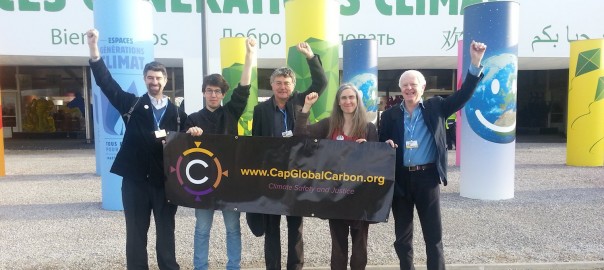![]() On the 5th of December the delegation of the Irish think-tank Feasta presented a fresh, new way to address climate change in a fair and highly effective manner on the COP21 Climate conference in Paris. This plan is called CapGlobalCarbon and it is aimed at tackling the problem of warming at its source by regulating the extraction of fossil fuels instead of the conventional end-of-pipe approach aimed at emission reduction. The main difference with the COP21 climate agreement is that CapGlobalCarbon is a citizen-led initiative where governments have no negotiation space: they either opt-in or they don’t.
On the 5th of December the delegation of the Irish think-tank Feasta presented a fresh, new way to address climate change in a fair and highly effective manner on the COP21 Climate conference in Paris. This plan is called CapGlobalCarbon and it is aimed at tackling the problem of warming at its source by regulating the extraction of fossil fuels instead of the conventional end-of-pipe approach aimed at emission reduction. The main difference with the COP21 climate agreement is that CapGlobalCarbon is a citizen-led initiative where governments have no negotiation space: they either opt-in or they don’t.
Just as one cannot negotiate with the climate system, one cannot negotiate on the required global de-carbonization rate. By leaving the “how much” question to science we have the best chances of staying below dangerous levels of atmospheric CO2.
How does this relate to the COP21 climate agreement? Has the CapGlobalCarbon project become obsolete now world leaders have promised to “do their bit”? We don’t think so. Many analyses have shown that this agreement isn’t enough to put us on the right track and we still seem to be heading towards a warming of 3 degrees or more. The two major shortcomings of this agreement are that it relies on yet to be invented technologies and excludes shipping and aviation. Interestingly, the CapGlobalCarbon solution can be implemented with no conflict to the efforts and intentions of the climate agreement. Fossil fuels are not mentioned nor regulated by this treaty as the focus is on the emissions resulting from burning fossil fuels, not the fuels themselves. This has frustrated many Keep it in the ground activists but this massive oversight by the policy makers can work to our advantage. The CapGlobalCarbon team shifted its strategy because of this lack of interest in fossil fuels. Where we first tried to get the UNFCCC and other institutions on board to make a cap on the extraction of fossil carbon part of their operation we now seek to set up CapGlobalCarbon as a parallel institution. A global blockadia that limits the extraction of fossil fuels to safe levels.
We need a complementary solution to fill the gaps that are left in the Paris climate agreement. The CapGlobalCarbon proposal can fill this gap because it prevents the fossil carbon from entering the market through an upstream cap. The shipping and aviation industries for example would, in a world where CapGlobalCarbon is implemented, comply to climate safety as their fuel has already been accounted for. How about we keep that 80% of the fuel in the ground and let the annual Conference Of Parties decide on policies for using the remaining 20% most effectively to build a sustainable society?
